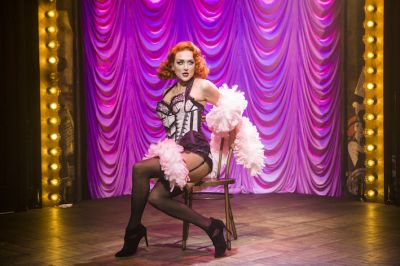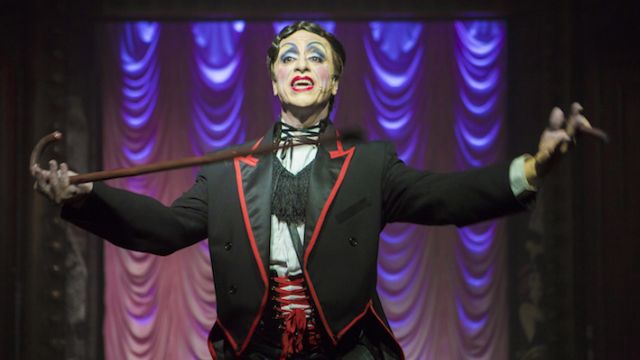Cabaret
Despite (or perhaps because of) one of the finest casts ever assembled, this production of Cabaret, a stalwart and favourite of Musical Theatre everywhere, tantalisingly holds out the promise of brilliance, only to snatch it away at the last minute. That’s not to say it isn’t good – it is in part – but it never seems to gel, to find a cohesive creative vision. We’re all aware that Gale Edwards took over the direction for the Melbourne season, so it’s hard to tell whether she was hampered by time, previous blocking that couldn’t be undone, or other limitations.
But first let’s talk about the sensational cast - and that will inevitably throw up some of the problems with the vision - or lack thereof.
Paul Capsis was born to play the Emcee, even if he is way too talented to ever be stuck in that sleazy club (I have the same complaint about Minnelli in the film). Capsis oozes charisma, creates a malevolent presence behind the ghoulish smile, nails all of his numbers, personifies decadence and owns the stage every minute he is upon it, BUT - and it’s a big but - this is not a story about an emcee, it’s a story about a young bisexual American writer and his affair with an extroverted, but fragile, English girl of mediocre talent. That is far from being a one-man show. When you have a talent as enormous as Capsis’ you use it sparingly and to advantage, unless it is intended for him to be the centrepiece, the star. So why have him as an observer (albeit a quiet one) sitting at a table downstage throughout all the scenes where he is not actively involved? It can’t help but pull focus (through no fault of Capsis) and it destroys all context of time and place, making the main story muddy and destroying momentum. We’re never sure of locale or how one scene relates to the time frame of another. That’s why the “one set fits all” approach doesn’t work. All praise to the actor, but it simply is detrimental to the production.
Chelsea Gibb is a stalwart of our Musical theatre – but did anyone actually read Christopher Isherwood’s original Sally Bowles story to get a hook on the character? A super well educated, plum in mouth accent, British aristocracy bred Sally just doesn’t work. This girl lives behind a façade. She’s mediocre and she knows it (she claims to be the daughter of a Lancashire Nouveau Riche mill owner). Poor Miss Gibb is forced to play Sally like a princess on vacation. What’s worse, numbers like “Money, Money”, which could give her a chance to play her “onstage” persona - as opposed to Sally’s reality, by seeing the relationship between her and the emcee - perhaps the only one to know her secret - have been taken away and the number made into an ensemble piece. It’s tragic; and Ms Gibb has to wait until late in the second act to give us, with her brilliant rendition of the title song, The Sally Bowles she’s been dying to unleash for two hours. It’s perhaps the most powerful acting rendition of the song I have ever heard.
I know that “Mein Herr” and “Maybe This Time” were never part of the original score – but neither was “You’re the One That I Want” in the original Grease. The fact remains that they are usually included because of audience recognition, and Lord knows Sally needs a big number in the first act; “Don’t Tell Mama seemed positively insipid.
Kate Fitzpatrick is no singer, but she a great actress in the right role - and Fraulein Schneider is the right role. And with the wonderfully endearing warmth and experience of John O’May’s Herr Shultz, the two are simply charming and memorable throughout.
Michael Cormick is always a brilliant addition to any production, whether as leading man or in a supporting role like Ernst Ludwig. As the character becomes more sinister and menacing, Cormick’s strength and stage command come to the fore. He’s an impressive presence.
 Debora Krizak brings all her comic skills to the role of Fraulein Kost, the prostitute, and very nearly overshadows Ms Gibb. She is always a delight to watch and this production is no exception. Jason Kos (Clifford) is an interesting presence, but he plays the role more for the weakness of character, rather than inner struggle of a man who cannot be seen – in his own world, in the 1930s – to be homosexual. It was a different world, a different set of taboos, and I’m not convinced that Kos understands that world. There’s a tragedy in wanting to bring home a wife, even one like Sally, rather than face what you really are – it’s not realised in this production (nor the last few I’ve seen, but I live in hope).
Debora Krizak brings all her comic skills to the role of Fraulein Kost, the prostitute, and very nearly overshadows Ms Gibb. She is always a delight to watch and this production is no exception. Jason Kos (Clifford) is an interesting presence, but he plays the role more for the weakness of character, rather than inner struggle of a man who cannot be seen – in his own world, in the 1930s – to be homosexual. It was a different world, a different set of taboos, and I’m not convinced that Kos understands that world. There’s a tragedy in wanting to bring home a wife, even one like Sally, rather than face what you really are – it’s not realised in this production (nor the last few I’ve seen, but I live in hope).
The rest of the cast is exemplary, despite the strange choices made in direction. Lindsay Partridge directs a truly excellent band (apart from one two bar gaffe from the Trombone player on Thursday) with his customary pursuit of excellence, and Kelly Abbey’s choreography is simply superb – witty and energised. How lucky we are to have her.
If the show doesn’t gel as it should, part of the problem is the set. Having the KitKat Club stage as the only playing area, with it being triangular and coming to a point at the front of the stage, cuts the playing space by half (if you know your geometry) and the ONLY person who stands downstage centre is the emcee – even in ensemble numbers, once again perpetuating the false premise that this is a show about an emcee. Paul Capsis doesn’t need a manipulated set to make him a star. He is one.,
How much better might it have been to have the triangle point as a thrust (or even a catwalk) – over the tables in the auditorium, widening the playing angle - or even allowing each unused side triangle of the stage to be used as the boarding house and the fruit shop, clearly delineating location for the non-club scenes. And it would also help if the whole thing looked a little less like Chequers Nightclub (Sydney 1960s) and a bit more like Berlin in 1933.
As for the final image of the Swastika flag…well, that only works if we haven’t seen a swastika up until that point. Then it would have impact. As the show stands, with Swastikas on-show through Act Two - it doesn’t. And I’ll refrain from mentioning horrors like the Gorilla reveal!
This production is still worth seeing - and politically pertinent all over again. - but it could have been something extraordinary that we could talk about for years. It isn’t. And that’s a pity.
Coral Drouyn
Images from the Sydney season - photographer: John McRae
Subscribe to our E-Newsletter, buy our latest print edition or find a Performing Arts book at Book Nook.

